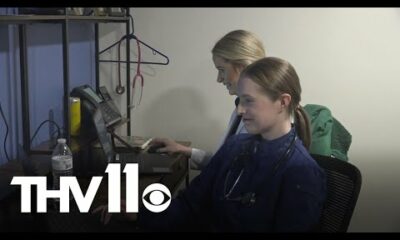Mississippi Today
Attorney General Fitch sides with Idaho in abortion lawsuit

Mississippi Attorney General Lynn Fitch filed another brief in support of the argument that states with strict abortion bans should be able to deny emergency medical care to pregnant women if that care involves an abortion.
The filing in the Idaho case is called an amicus curiae brief, which allows interested parties not directly involved in a court case to submit legal documents voicing their opinion.
The case began when the Biden administration sued Idaho for barring abortions when a pregnant woman’s health is at risk.
Fitch added Mississippi to the amicus brief in 2022, immediately after the Dobbs decision overturned the constitutional right to abortion. Nineteen other states now stand with Mississippi, according to the newest court filing.
Fitch’s office declined to comment for this story.
At the heart of the case, explained Mary Ziegler, one of the country’s preeminent experts on abortion law and a professor at UC Davis School of Law, is a discussion of health versus life – which she says is less of a philosophical distinction and more of a political strategy.
“There are plenty of things that go wrong in pregnancy that can really affect your health that aren’t going to necessarily imminently kill you. But if you’re coming from a movement perspective, you see all these health justifications basically as loopholes that people are exploiting,” she said. “So, some states responded to that anxiety like Texas by having a health exception but having it be very, very, very narrow, and other states like Mississippi responded by just not having a health exception at all.”
In fact, national health policy organization KFF does not consider Texas’ health exception – to prevent “substantial impairment of major bodily function” – to be an exception at all. Mississippi is one of six ban states which does not have an exception for the health of the mother.
Arkansas, Idaho, Oklahoma, South Dakota and Texas are the other five, according to KFF. All six have exceptions to protect the life of the mother.
The federal law at odds with these state bans is called EMTALA, or the Emergency Medical Treatment and Active Labor Act, which requires medical providers to stabilize everyone entering the emergency room before discharging or transferring them. The Biden administration argued that treatment should include abortion and should apply to mothers in ban states – if the mother’s pregnancy poses a risk to her health.
These 20 states, including Mississippi, that have joined the “friend of the court” brief have “a profound interest in preserving the federalist structure, their power to regulate for the welfare of their citizens, and state laws adopted by citizens’ elected representatives to protect unborn children from intentional destruction,” according to the brief.
While the argument of the amicus brief relies heavily on the principle of state rights, it also presents several anti-abortion defenses, including that doctors should not be allowed to prioritize the health of women over unborn children.
“That EMTALA imposes obligations on hospitals to pregnant women does not allow hospitals to ignore the health of unborn children,” the brief reads. “Hospitals cannot ‘pick and choose’ between their dual obligations. They must stabilize both women and unborn children.”
But allowing states to treat life and health differently, Ziegler said, doesn’t create a distinction as much as it causes confusion.
“If you’re going to lose an organ or be permanently disabled – does that fall under life exception or not? And some states say ‘well, yeah, our life exception doesn’t require you to be imminently dying, it just requires that there be a threat to your life, and certain organ damage could qualify.’ But it’s also sort of unclear.”
After Mississippi’s abortion ban took hold in July 2022, the state’s number of abortions plummeted to nearly zero – despite the fact that Mississippi’s ban has two exceptions: to protect the life of the mother, and cases where the pregnancy was caused by rape and reported to law enforcement.
Cases like Ashley, the 13-year-old Delta girl TIME magazine wrote about who was raped and forced to carry her baby to term, show that the exceptions can be theoretical.
Only four abortions were performed in Mississippi in 2023, according to data from the Mississippi State Department of Health.
If the Supreme Court votes in favor of the states, Ziegler says it probably wouldn’t change much for a state like Mississippi. If, however, the Supreme Court votes in favor of the Biden administration, it could change the landscape – not of abortion generally, but in those instances where a woman goes to the emergency room for pregnancy complications and doctors are deciding if they can legally treat her.
“If the Supreme Court ultimately said that EMTALA does cover a universe of physical emergencies that are not imminently life-threatening, and here are some of those examples, it would be very hard for Mississippi prosecutors to go after anyone who performed procedures in those circumstances,” Ziegler said.
A similar case is playing out in Texas.
The Idaho case is currently awaiting an oral arguments hearing in December, after which the 9th U.S. Circuit Court of Appeals will issue an opinion. If appealed, it will return to the Supreme Court.
This article first appeared on Mississippi Today and is republished here under a Creative Commons license.![]()
Mississippi Today
On this day in 1958


Dec. 20, 1958

Bruce Boynton was heading home on a Trailways bus when he arrived in Richmond, Virginia, at about 8 p.m. The 21-year-old student at Howard University School of Law — whose parents, Amelia Boynton Robinson and Sam Boynton, were at the forefront of the push for equal voting rights in Selma — headed for the restaurant inside the bus terminal.
The “Black” section looked “very unsanitary,” with water on the floor. The “white” section looked “clinically clean,” so he sat down and asked a waitress for a cheeseburger and a tea. She asked him to move to the “Black” section. An assistant manager followed, poking his finger in his face and hurling a racial epithet. Then an officer handcuffed him, arresting him for trespassing.
Boynton spent the night in jail and was fined $10, but the law student wouldn’t let it go. Knowing the law, he appealed, saying the “white” section in the bus terminal’s restaurant violated the Interstate Commerce Act. Two years later, the U.S. Supreme Court agreed. “Interstate passengers have to eat, and they have a right to expect that this essential transportation food service,” Justice Hugo Black wrote, “would be rendered without discrimination prohibited by the Interstate Commerce Act.”
A year later, dozens of Freedom Riders rode on buses through the South, testing the law. In 1965, Boynton’s mother was beaten unconscious on the day known as “Bloody Sunday,” where law enforcement officials beat those marching across the Selma bridge in Alabama. The photograph of Bruce Boynton holding his mother after her beating went around the world, inspiring changes in voting rights laws.
He worked the rest of his life as a civil rights attorney and died in 2020.
This article first appeared on Mississippi Today and is republished here under a Creative Commons license.![]()
Mississippi Today
‘Something to be proud of’: Dual-credit students in Mississippi go to college at nation’s highest rate

Mississippi high school students who take dual-credit courses go to college at the nation’s highest rate, according to a recent report.
It’s generally true that students who take college classes while in high school attend college at higher rates than their peers. Earlier this year, a study from the Community College Research Center at Teacher’s College, Columbia University found that nationally, 81% of dual-credit students go to college.
In Mississippi, that number shoots up to 93%, meaning the vast majority of the state’s high school students who take college classes enroll in a two- or four-year university.
“When we did this ranking, boom, right to the top it went,” said John Fink, a senior research associate and program lead at the research center who co-authored the study.
State officials say there’s likely no silver bullet for the high rate at which Mississippi’s dual-credit students enroll in college. Here, “dual credit” means a course that students can take for both high school and college credit. It’s different from “dual enrollment,” which refers to a high school student who is also enrolled at a community college.
In the last 10 years, participation in these programs has virtually exploded among Mississippi high school students. In 2014, about 5,900 students took dual-credit courses in Mississippi, according to the Mississippi Community College Board.
Now, it’s more than 18,000.
“It reduces time to completion on the post-secondary level,” said Kell Smith, Mississippi C0mmunity College Board’s executive director. “It potentially reduces debt because students are taking classes at the community college while they’re still in high school, and it also just exposes high school students to what post-secondary course work is like.”
“It’s something to be proud of,” he added.
There are numerous reasons why Mississippi’s dual-credit courses have been attracting more and more students and helping them enroll in college at the nation’s highest rate, officials say.
With a few college credits under their belt, students may be more inspired to go for a college degree since it’s closer in reach. Dual-credit courses can also build confidence in students who were on the fence about college without requiring them to take a high-stakes test in the spring. And the Mississippi Department of Education’s accountability model ensures that school districts are offering advanced courses like dual credit.
Plus, Mississippi’s 15 community colleges reach more corners of the state, meaning districts that may not be able to offer Advanced Placement courses can likely partner with a nearby community college.
“They’re sometimes like the only provider in many communities, and they’re oftentimes the most affordable providers,” Fink said.
Test score requirements can pose a barrier to students who want to take dual-credit courses, but that may be less of a factor in Mississippi. While the state requires students to score a 19 on ACT Math to take certain courses, which is above the state average, a 17 on the ACT Reading, below the state average of 17.9, is enough for other courses.
Transportation is another barrier that many high schools have eliminated by offering dual-credit courses on their campuses, making it so students don’t have to commute to the community colleges to take classes.
“They can leave one classroom, go next door, and they’re sitting in a college class,” said Wendy Clemons, the Mississippi Department of Education’s associate state superintendent for secondary education.
This also means high school counselors can work directly with dual-credit students to encourage them to pursue some form of college.
“It is much less difficult to graduate and not go to college when you already possess 12 hours of credit,” Clemons said.
Word-of-mouth is just as key.
“First of all, I think parents and community members know more about it,” Clemons said, “They have almost come to expect it, in a way.”
This all translates to benefits to students. Students who take dual-credit courses are more likely to finish college on time. They can save on student debt.
But not all Mississippi students are benefiting equally, Fink said. Thr research center’s report found that Black students in Mississippi and across the country were less likely to pursue dual-credit opportunities.
“The challenge like we see in essentially every state is that who’s in dual enrollment is not really reflective of who’s in high school,” Fink said.
Without more study, it’s hard to say specifically why this disparity exists in Mississippi, but Fink said research has generally shown it stems from elitist beliefs about who qualifies for dual-credit courses. Test score requirements can be another factor, along with underresourced school districts.
“The conventional thinking is (that) dual enrollment is just … another gifted-and-talented program?” Fink said. “It has all this baggage that is racialized … versus, are we thinking about these as opportunities for any high school student?”
Another factor may be the cost of dual-credit courses, which is not uniform throughout the state. Depending on where they live, some students may pay more for dual-credit courses depending on the agreements their school districts have struck with local community colleges and universities.
This isn’t just an equity issue for students — it affects the institutions, too.
“You know, we’ve seen that dual-credit at the community college level can be a double-edged sword,” Smith said. “We lose students who oftentimes … want to stay as long as they can, but there are only so many hours they can take at a community college.
Dual-credit courses, which are often offered at a free or reduced price, can also result in less revenue to the college.
“Dual credit does come at a financial price for some community colleges, because of the deeply discounted rates that they offer it,” Smith said. “The more students that you have taking dual-credit courses, the more the colleges can lose.”
State officials are also working to turn the double-edged sword into a win-win for students and institutions.
One promising direction is career-technical education. Right now, the vast majority of dual credit students enroll in academic courses, such as general education classes like Composition 1 or 2 that they will need for any kind of college degree.
“CTE is far more expensive to teach,” Clemons said.
Smith hopes that state officials can work to offer more dual-credit career-technical classes.
“If a student knows they want to enroll in career-tech in one of our community colleges, let’s load them up,” Smith said. “Those students are more likely to enter the workforce quicker. If you want to take the career-tech path, that’s your ultimate goal.”
This article first appeared on Mississippi Today and is republished here under a Creative Commons license.![]()
Mississippi Today
Ex-Capitol Police officer faces federal civil rights charge

A former Capitol Police officer has been accused of violating the civil rights of a handcuffed man whose head he slammed into the hood of a car and kicked in 2022.
Jeffery Walker, a former officer with the Flex Unit, was in federal court Wednesday. He faces up to 10 years in federal prison for one charge of deprivation of rights under the color of law.
The person Walker is accused of injuring is identified in court records as E.S.
On July 27, 2022, Walker was on duty and driving an unmarked car when he tried to stop E.S.’s car, but E.S. did not pull over and led Walker on a chase, according to an indictment unsealed Wednesday.
Three unnamed Jackson Police Department officers joined in the chase until Walker cut E.S. off, which caused Walker to hit a tree and E.S. to swerve into a yard. Walker and the JPD officers approached E.S.’s car, pulled him out, put him on the ground and handcuffed him.
The indictment states Walker grabbed E.S. by the back of the neck and slammed his head into the car hood, before putting him back on the ground and kicking him in the head and face.
Magistrate Judge Andrew Harris approved an unsecured $10,000 bond for Walker.
Walker’s trial is scheduled for Feb. 10, 2025 with U.s. District Judge Henry Wingate.
The former Capitol Police officer also faces an excessive force lawsuit filed last year stemming from an incident that happened weeks after the 2022 incident.
On Aug. 14, 2022, Sherita Harris was a passenger in a car driven by her friend. As the car waited for a traffic signal to turn green on State and Amite streets, the lawsuit alleges Walker and Capitol Police Officer Michael Rhinewalt approached the car from behind, turned on its emergency lights and directed the car to pull over.
Shortly after the driver pulled over, Rhinewalt began to shoot into the car, according to the lawsuit. The driver fled to avoid bullets, but Harris was hit in the head and slumped over in her seat.
She was taken to the hospital where she had surgery to remove bullet fragments from her head, according to the lawsuit. The injuries left her with lingering issues including with her speech and cognitive abilities.
As of December, the lawsuit remains active. The lawsuit seeks $3 million in damages, and the case is expected to go to trial in October 2025.
The officers offered a different account.
Walker was called as a witness in a September 2022 preliminary hearing for Sinatra Jordan, the driver of the car, who has been charged with fleeing law enforcement, assault of a law enforcement officer, resisting arrest and possession of marijuana.
NBC News reported about Walker’s testimony in which he said the car ran a red light and took off after the officers got out of their cruisers. Walker and Rhinewalt chased the car and said they heard gunshots coming from it and saw items thrown out of the window.
The car crashed into a curb and they saw the driver with a black object in his hands, prompting them to return fire.
Jordan remains at the Raymond Detention Center and is expected to go to trial in March 2025.
This article first appeared on Mississippi Today and is republished here under a Creative Commons license.![]()
-

 News from the South - Arkansas News Feed5 days ago
News from the South - Arkansas News Feed5 days agoFaith-inspired ministry opens health clinic in Little Rock
-

 News from the South - Florida News Feed4 days ago
News from the South - Florida News Feed4 days ago‘Dirty Dancing,’ ‘Beverly Hills Cop,’ ‘Up in Smoke’ among movies entering the National Film Registry
-

 Our Mississippi Home4 days ago
Our Mississippi Home4 days agoThe Meaning of the Redbird During the Holiday Season
-

 Mississippi Today6 days ago
Mississippi Today6 days agoOn this day in 1961
-

 Mississippi Today3 days ago
Mississippi Today3 days agoMississippi PERS Board endorses plan decreasing pension benefits for new hires
-

 News from the South - South Carolina News Feed7 days ago
News from the South - South Carolina News Feed7 days agoWinter Alerts for North Carolina
-

 Mississippi Today5 days ago
Mississippi Today5 days agoOn this day in 1976
-

 News from the South - Texas News Feed2 days ago
News from the South - Texas News Feed2 days agoAmazon workers strike at facilities around the country as Teamsters seek contract
































